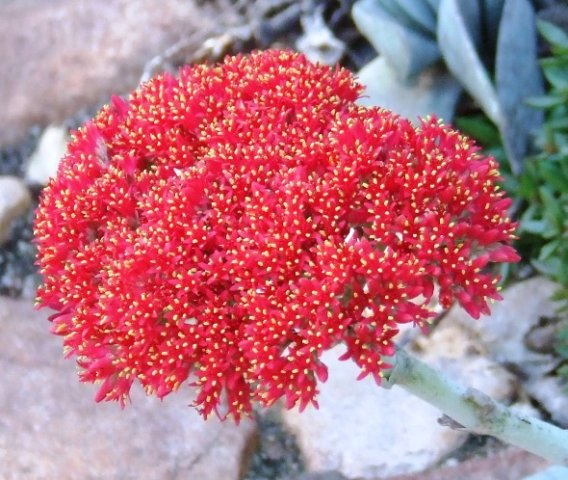Crassula perfoliata var. falcata

Crassula perfoliata comprises four recognized varieties, var. falcata no longer being one of them. There are only two red flowering options to choose from for this distinctly grey-leaved garden plant. Var. minor is a small (smaller than this one?) plant with grey-green (greener?) leaves and var. coccinea with yellow-green ones; neither quite providing a fit. Maybe this is a horticulturally developed cultivar and not a natural species.
C. perfoliata is but one of thousands of plants that have complex recorded histories in botanical literature, reflecting both knowledge growth and judgment calls regarding taxonomic decisions. Bypassing the debating may lead to settling for a homemade common name and maybe a bewildering proliferation of such names. Or one may merely enjoy another nameless plant by its looks alone. To some the scientific names are simply too daunting, particularly the frustrating changes occurring in those long names.
Gardeners dont change their names (too often) after all. Their pet plants shouldnt either! Unfortunately there is elusive stuff going on to do with the characteristics of and relations among the plants of ones interest. Dipping into that knowledge and absorbing selected bits of it do add to ones enjoyment of the plants encountered in everyday life. And for that one needs names:
Just as some people do not start conversations with strangers and thaw only after introductions or serendipitous opportunities, plants sometimes become better appreciated when their names are known. Getting into nature, or just a little closer, one small step, is an appealing consideration.
Relating to nature, its animals and plants, may either be routine relaxation lacking significance, or a deeply personal experience sought and enjoyed repeatedly. A lifelong behaviour pattern, a rewarding personal style may ensue, grow into a key ingredient of ones experience.
For some the focus is on intuition fed by quiet reflection and observation. Mental activity may uncover a private range of feelings, an animal enjoyment or a therapeutic soothing, maybe even a bit addictive. Outcomes may relate to shedding of stress for coping with everything life presents, it may bring insights into self and yield life-changing decisions and breakthroughs, or become a healing and life-sustaining communion.
For others the bush sets the mind racing, the curiosity heightened. Intellectual pursuits may result, be they escapes into learning and discovery of birding, the ocean, mountains, forests or deserts. Ecology teaches relationships among more or less everything, conservation offers outlets for growing citizenship values, escapism transports far away from taxing job and everyday obligations.
Or both dimensions may develop and feed off each other?

